#Exodus International
Explore tagged Tumblr posts
Text
Eliel Cruz for Teen Vogue:
When I was a teenager in the early aughts, conversion therapists reigned supreme in evangelical Christian spaces, spewing pseudo-scientific techniques as a supposed “remedy” for LGBTQ identities. Growing up in the Seventh-day Adventist church and school system, LGBTQ identities were vilified and demonized at the pulpit and in our classrooms. The answer to our sexualities, according to the church, was to deny ourselves love or a partner, stay celibate, or to work on “changing” our sexuality so that we were no longer queer. There were groups and conferences with self-proclaimed “ex-gay” speakers providing testimonies about how they “overcame” their sexuality and therapists eager to “help” others pursue the same path.
According to a Williams Institute report, 7% of LGB adults ages 18 to 59 in the United States have undergone conversion therapy. About 81% of those individuals were in “therapy” with religious leaders, which heightened suicidal thoughts and ideation in comparison to LGB people who have not gone through conversion “therapy” practices. Across the globe, these numbers fluctuate between 2% all the way up to 34% of LGBTQ+ people having undergone conversion practices. By the mid-2010s, these groups and their influence began to dwindle as national organizations like Exodus International, one of the longest-running and largest ex-gay organizations, shuttered its doors after 37 years, admitting that not only did conversion or reparative therapy not work, it was harmful to the LGBTQ people subjected to it. Former Exodus International President Alan Chambers said: "I am sorry for the pain and hurt many of you have experienced. I am sorry that some of you spent years working through the shame and guilt you felt when your attractions didn't change,” admitting his own attractions to men had not gone away, despite being married to a woman and having children.
The closing of Exodus International signaled the end of a decades-long push for ex-gay therapy, or so it would seem. But in recent years, as legislation has passed across the country to ban conversion therapy for youth, a new push for so-called “change therapy” has re-emerged with the same flawed premise and tactics of the ex-gays of old. A group called Changed Movement, formed in response to legislation banning conversion therapy in California, is one such group using new language to promote the same-old conversion therapy. Conversion or reparative therapy, loosely defined, is any attempt to influence and change someone’s sexual orientation or gender identity. Often, these counselors blame trauma or violence, family dynamics, or your upbringing as the root of the deviant sexuality or gender identity. Changed Movement shares stories of individuals blaming these roots as the cause of their sexuality or gender. This assertion is false and only serves to shame the individual, often for reasons beyond their control. Importantly, ex-gay groups like the Changed Movement do not seem to reckon with the fluidity of sexuality and gender and, as proponents of this ideology typically do, seemingly view things as either gay or straight, trans or cisgender.
[...] In a report by the Trevor Project, researchers found at least 1,320 conversion therapy practitioners in almost all 50 states, including states with active conversion therapy bans for minors. Almost half of those counselors are unlicensed, and most are attached to some sort of religious ministry. While couching their language and pretending to be there to help LGBTQ people, the danger of these groups and practitioners cannot be understated.
Recently, an ex-gay group called Coming Out Ministries bought a building across from my alma mater, Andrews University, a Seventh-day Adventist University, intending to “work closely” with the university on LGBTQ issues “from a redemptive perspective.” Groups like Changed Movement and Coming Out Ministries see LGBTQ young people’s identities as “confusion” instead of who they are intrinsically. Their ideology stems from a theological understanding of sexuality that does not take into account science or the world as it exists around them. Anti-LGBTQ theology fuels conversion therapy, and it’s not only flawed but also inherently harmful and violent. As a queer person of faith, I reject theology and religious practices that cause harm, as it is not from God. The history and devastating impacts of ex-gay practices are clear in the irreparable damage it has caused to large swathes of the LGBTQ community raised in religious settings.
Eliel Cruz writes in Teen Vogue the changing history of anti-LGBTQ+/anti-trans medical pseudoscience practice of conversion therapy.
#Conversion Therapy#Ex Gay#LGBTQ+#Transgender#Religion#Changed Movement#Exodus International#Coming Out Ministries
32 notes
·
View notes
Text
I may have just heard the best "there was only one bed" story ever and I might have tears in my eyes, lemme type it out
So in 1976 the very devout friends Michael Bussee and Gary Cooper (not the actor) founded a conservative christian ex-gay organisation called "Exodus International" that saw homosexuality as a sin and strongly promoted conversion therapy, the two of them describing themselves as 'recovered ex-gays' as well. The whole thing was (sadly) quite successful (prominence and size initially skyrocketed and it eventually had ministries and centers in 18 countries).
However, you see, Michael and Gary worked quite closely together for a long time and... One day in 1979 they couldn't take it anymore, broke down, and confessed that they did and always had loved each other.
The thing is, they were scheduled to give one of their regular "hey we were gay once but aren't anymore and you too can cure this sin (yay)!" talks at a big American christian church's congressional meeting in front of hundreds of believers. It was enough of a big deal that there were lgbt+ right's activists protesting their talk.
On the plane they quickly re-wrote their usual speech to now be about love and acceptance and decided to never give one of their old talks again.
As they gave this speech the protesters quieted down and eventually started applauding while the actual audience grew increasingly impatient and sour. By chance, it was also at this particular event that the organizers had made a little mistake: They had booked just one hotel room for both Michael and Gary and it had. only one. bed.
So they basically thought to themselves 'oh, God is clearly steering us in a new (old) direction!'.
#gay#tw homophobia#homosexual#there was only one bed#cw religion#mlm#don't know what to tag this as but thought tumblr might like this true story#please beware that the documentary I'm linking as source depicts some really intense homophobia alongside more uplifting stories#exodus international#michael bussee#gary cooper
5 notes
·
View notes
Text
What Are They Trying to Hide
So I don't think I ever want someone to go through what I went through regarding the gay conversion/reparative therapy I went through in the 1990s. It's not successful... for many reasons. But I've noticed a new movement in recent years and it's from a new batch of people that did not (to my knowledge) have any ties to the other group (Exodus International).
These individuals had been gay and lived the gay lifestyle for quite some time before surrendering their life to Jesus Christ. Then, (those that are publicly pronouncing their conversion) they have said that it was Christ that led them out of the sin of same-sex attractions. It may seem similar to the movement from the 1990s, but it's not. This movement is quite different and has been fighting to help the contemporary church realize that modern beliefs (often called Side-B Christianity) have no place in a religion that is based on the Bible and the biblical truths that are found within It's pages.
However, I am annoyed that while they have solid beliefs and scripture to affirm their beliefs, they are not addressing the arguments that the modern gay Christians are promoting. Or maybe they are (correct me if I am wrong by messaging me)?
I hope that I can see a good honest debate of the scriptures from these two sides. I am not sure which I completely believe at this point. I might actually have to study/learn ancient Hebrew and Greek in order to fully understand what might be actually written in the scripture. So I guess I will just have to wait until I get to heaven when "all will be revealed."
#gay baptist#gay christian#noticedandannoyed#gay men#exodus international#side-b christianity#gay conversion therapy#gay reparative therapy#ex-gay#exodusinternational#gayconversiontherapy#sidebchristianity#gayreparativetherapy
1 note
·
View note
Text
Yeah it's funny how twitter is imploding, but can we please start talking about how the largest international emergency broadcast and communication system is currently being torn to bits by a billionaire toddler having a tantrum?
How a private company controlling such a vital network is a terrible idea, and why there is zero international appetite for oversight or creation of an alternative?
When was the last time you relied on anything besides twitter to tell you about a global crisis or natural disaster?
This is a very serious wakeup call that is being ignored by pretty much everyone. Big conversations about the role of private companies in international communities are being shut down with jokes about "the libs" and "woke sjws", because it's financially inconvenient to admit that they've accidentally created a vital international service, and playing with that is costing lives because THERE IS NO ALTERNATIVE.
234 notes
·
View notes
Text

The Ark of the Covenant
1 Bezalel made the ark of acacia wood two and a half cubits long, one and a half cubits wide, and one and a half cubits high. 2 He overlaid it with pure gold, inside and outside, and made a gold molding around it. 3 He cast four rings for it on its four feet, two rings on one side of it and two rings on its other side. 4 He made poles of acacia wood and overlaid them with gold. 5 He put the poles into the rings on the sides of the ark to carry it.
6 He made a Mercy Seat of pure gold two and a half cubits long and one and a half cubits wide. 7 He made two cherubim of gold; he made them of hammered work at the two ends of the Mercy Seat. 8 One cherub was at one end and one cherub at the other end. He made the cherubim at the two ends of the Mercy Seat and of one piece with it. 9 The cherubim had their wings spread upward, covering the Mercy Seat with their wings and facing each other. The faces of the cherubim were turned toward the Mercy Seat.
The Table of Showbread
10 Then he made a table of acacia wood two cubits long, one cubit wide, and one and a half cubits high. 11 He overlaid it with pure gold and put a gold molding around it. 12 He made a rim one handbreadth wide around it, and made a gold molding around the rim. 13 He cast four gold rings for it and put the rings on the four corners where its four feet were. 14 The rings were close to the rim as holders for the poles to carry the table. 15 He made the poles of acacia wood and overlaid them with gold to carry the table. 16 He made the utensils which were on the table, its plates, dishes, bowls, and jars out of which libations are poured. He made them of pure gold.
The Lamp Stand
17 He made the lamp stand of pure gold. He made the lamp stand, its base, and stem of hammered work and its cups, calyxes, and flowers were of one piece with it. 18 Six branches extended from its sides, three branches of the lamp stand from one side of it, and three branches of the lamp stand from its other side. 19 Three cups shaped like almond blossoms with calyxes and flowers were on one branch and three cups shaped like almond blossoms with calyxes and flowers were on the other branch, and so on for the six branches extending from the lamp stand. 20 On the lamp stand itself there were four cups shaped like almond blossoms each with their calyxes and flowers. 21 A calyx was under the two branches that extended out of the stem; a calyx was under the next pair of branches that extended out of the stem; and a calyx was under the last pair of branches that extended out of the stem, and so on for the six branches extending from the lamp stand. 22 Their calyxes and their branches were of one piece with it, all of it was of one piece of hammered work of pure gold. 23 He made its seven lamps, its tongs, and its trays from pure gold. 24 He made it and all of its furnishings from a talent of pure gold.
The Altar for Incense
25 He made the altar for burning incense of acacia wood, a square, one cubit long, one cubit wide, and two cubits high, with its horns of one piece with it. 26 He overlaid it with pure gold—its top, its sides all around, and its horns—and he made a gold molding around it. 27 He made two gold rings for it under its molding, on its two opposite sides, as holders for poles by which to carry it. 28 He made the poles of acacia wood and overlaid them with gold. 29 And he made the holy anointing oil and the pure aromatic incense, the work of a perfumer. — Exodus 37 | International Standard Version (ISV) The Holy Bible: International Standard Version® Copyright © 1996-2012 The ISV Foundation. All rights reserved internationally. Cross References: Exodus 25:5; Exodus 25:10-11; Exodus 25:17; Exodus 25:27; Exodus 25:31-32; Exodus 25:33-34; Exodus 25:35-36; Exodus 30:1; Exodus 30:23; Exodus 30:25; Exodus 31:7-8; Exodus 37:10; 1 Kings 6:23; 1 Kings 6:27; 1 Kings 8:8; Hebrews 9:4; Hebrews 9:4; Revelation 1:12; Revelation 1:20
Exodus 37 Bible Commentary - Matthew Henry (concise)
Key Passages in Exodus 37
1. The ark and mercy seat with cherubim made 10. The table of showbread with its vessels 17. The candlestick with its lamps and instruments 25. The altar of incense 29. The anointing oil and sweet incense
#Ark#creation#building#lampstand#altar for incense#table of showbread#Exodus 37#Book of Exodus#Old Testament#ISV#ISV Foundation#International Standard Version Bible
16 notes
·
View notes
Quote
Celebrate the Festival of Unleavened Bread. For seven days eat bread made without yeast, as I commanded you. Do this at the appointed time in the month of Aviv, for in that month you came out of Egypt.
Exodus 34:18 NIV (2011)
#bible verse#scripture#religion#passover in the Bible#biblical holidays#festivals#yeast#bread#commands#the law#remembering#exodus 34#new international version
17 notes
·
View notes
Text
The economic indicators speak of nothing less than an economic catastrophe. Over 46,000 businesses have gone bankrupt, tourism has stopped, Israel’s credit rating was lowered, Israeli bonds are sold at the prices of almost “junk bonds” levels, and the foreign investments that have already dropped by 60% in the first quarter of 2023 (as a result of the policies of Israel’s far-right government before October 7) show no prospects of recovery. The majority of the money invested in Israeli investment funds was diverted to investments abroad because Israelis do not want their own pension funds and insurance funds or their own savings to be tied to the fate of the State of Israel. This has caused a surprising stability in the Israeli stock market because funds invested in foreign stocks and bonds generated profit in foreign currency, which was multiplied by the rise in the exchange rate between foreign currencies and the Israeli Shekel. But then Intel scuttled a $25 billion investment plan in Israel, the biggest BDS victory ever. These are all financial indicators. But the crisis strikes deeper at the means of production of the Israeli economy. Israel’s power grid, which has largely switched to natural gas, still depends on coal to supply demand. The biggest supplier of coal to Israel is Colombia, which announced that it would suspend coal shipments to Israel as long as the genocide was ongoing. After Colombia, the next two biggest suppliers are South Africa and Russia. Without reliable and continuous electricity, Israel will no longer be able to pretend to be a developed economy. Server farms do not work without 24-hour power, and no one knows how many blackouts the Israeli high-tech sector could potentially survive. International tech companies have already started closing their branches in Israel. Israel’s reputation as a “startup nation” depends on its tech sector, which in turn depends on highly educated employees. Israeli academics report that joint research with universities abroad has declined sharply thanks to the efforts of student encampments. Israeli newspapers are full of articles about the exodus of educated Israelis. Prof. Dan Ben David, a famous economist, argued that the Israeli economy is held together by 300,000 people (the senior staff in universities, tech companies, and hospitals). Once a significant portion of these people leaves, he says, “We won’t become a third world country, we just won’t be anymore.”
19 July 2024
6K notes
·
View notes
Text
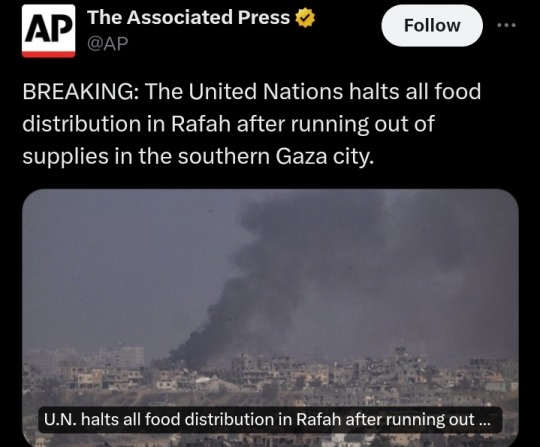
The United Nations said Tuesday it suspended food distribution in the southern Gaza city of Rafah due to lack of supplies and insecurity. It also said no aid trucks entered in the past two days via a floating pier set up by the U.S. for sea deliveries. The U.N. has not specified how many people have stayed in Rafah since the Israeli military began its intensified assault there two weeks ago, but apparently several hundred thousand people remain. The World Food Program said it was also running out of food for central Gaza, where hundreds of thousands of Palestinians fleeing Rafah have sought shelter in a chaotic exodus, setting up new tent camps or crowding into areas already devastated by previous Israeli offensives. Abeer Etefa, a spokesperson for the U.N’s World Food Program, warned that “humanitarian operations in Gaza are near collapse.” If food and other supplies don’t resume entering Gaza “in massive quantities, famine-like conditions will spread,” she said.
The prosecutor at the International Criminal Court cited Israeli Prime Minister Benjamin Netanyahu and Defense Minister Yoav Gallant for alleged “use of starvation as a method of warfare,” a charge they and other Israeli officials angrily deny. The prosecutor accused three Hamas leaders of war crimes over killings of civilians in the group’s Oct. 7 attack. The U.N says some 1.1 million people in Gaza – nearly half the population — face catastrophic levels of hunger and that the territory is on the brink of famine. The crisis in humanitarian supplies has spiraled in the two weeks since Israel launched an incursion into Rafah on May 6, vowing to root out Hamas fighters. Troops seized the Rafah crossing into Egypt, which has been closed since. Since May 10, only about three dozen trucks made it into Gaza via the nearby Kerem Shalom crossing from Israel because fighting makes it difficult for aid workers to reach it, the U.N. says. For months, the U.N. has warned that an Israeli assault on Rafah could wreck the effort to get food, medicine and other supplies to Palestinians across Gaza. Throughout the war, Rafah has been filled with scenes of hungry children holding out pots and plastic containers at makeshift soup kitchens, with many families reduced to eating only one meal a day. The city’s population had swelled to some 1.3 million people, most of whom fled fighting elsewhere. Around 810,000 people have streamed out of Rafah, although Israel says it has not launched the full-fledged invasion of the city it had planned. The United States has said Israel did not present a “credible” plan for evacuating the population or keeping it safe. The main agency for Palestinian refugees, UNRWA, announced the suspension of distribution in Rafah in a post on X, without elaborating beyond citing the lack of supplies. U.N. spokesman Stephane Dujarric said the UNRWA distribution center and the WFP’s warehouses in Rafah were “inaccessible due to ongoing military operations.”
An absolute nightmare
#yemen#jerusalem#tel aviv#current events#palestine#free palestine#gaza#free gaza#news on gaza#palestine news#news update#war news#war on gaza#rafah#all eyes on rafah#famine#gaza genocide#rafah under attack#united nations#genocide
4K notes
·
View notes
Text


1 note
·
View note
Text
It is over and everything is lost. This is the refrain repeated by Armenian families as they take that final step across the border out of their home of Nagorno-Karabakh.
In just a handful of days more than 100,000 people, almost the entire Armenian population of the breakaway enclave, has fled fearing ethnic persecution at the hands of Azerbaijani forces. The world barely registered it. But this astonishing exodus has vanished a self-declared state that thousands have died fighting for and ended a decades-old bloody chapter of history.
On Saturday, along that dusty mountain road to neighbouring Armenia, a few remaining people limp to safety after enduring days in transit.
Among them is the Tsovinar family who appear bundled in a hatchback littered with bullet holes, with seven relatives crushed in the back. Hasratyan, 48, the mother, crumbles into tears as she tries to make sense of her last 48 hours. The thought she cannot banish is that from this moment forward, she will never again be able to visit the grave of her brother killed in a previous bout of fighting.
“He is buried in our village which is now controlled by Azerbaijan. We can never go back,” the mother-of-three says, as her teenage girls sob quietly beside her.
“We have lost our home, and our homeland. It is an erasing of a people. The world kept silent and handed us over”.
She is interrupted by several ambulances racing in the opposite direction towards Nagorno-Karabakh’s main city of Stepanakert, or Khankendi, as it is known by the Azerbaijani forces that now control the streets. Their job is to fetch the few remaining Karabakh Armenians who want to leave and have yet to make it out.
“Those left are the poorest who have no cars, the disabled and elderly who can’t move easily,” a first responder calls at us through the window. “Then we’re told that’s it.”
As the world focused on the United Nations General Assembly, the war in Ukraine and, in the UK, the felling of an iconic Sycamore tree, a decades old war has reignited here unnoticed.
It ultimately heralded the end of Nagorno-Karabakh, a breakaway Armenian region, that is internationally recognised as being part of Azerbaijan but for several decades has enjoyed de facto independence. It has triggered the largest movement of people in the South Caucasus since the collapse of the Soviet Union.
Azerbaijan has vehemently denied instigating ethnic cleansing and has promised to protect Armenians as it works to reintegrate the enclave.
But in the border town of Goris, surrounded by the chaotic arrival of hundreds of refugees, Armenia’s infrastructure minister says Yerevan was now struggling to work out what to do with tens of thousands of displaced and desperate people.
“Simply put this is a modern ethnic cleansing that has been permitted through the guilty silence of the world,” minister Gnel Sanosyan tells The Independent, as four new busses of fleeing families arrive behind him.
“This is a global shame, a shame for the world. We need the international community to step up and step up now.”
The divisions in this part of the world have their roots in centuries-old conflict but the latest iterations of bitter bloodshed erupted during the collapse of the Soviet Union. The Karabakh Armenians, who are in the majority in the enclave, demanded the right to autonomy over the 4,400 square kilometre rolling mountainous region that has its own history and dialect. In the early 1990s they won a bloody war that uprooted Azerbaijanis, building a de facto state that wasn’t internationally unrecognised.
That is until in 2020. Azerbaijan, backed by Turkey, launched a military offensive and took back swathes of territory in a six-week conflict that killed thousands of soldiers and civilians. Russia, which originally supported Armenia but in recent years has grown into a colder ally, brokered a fragile truce and deployed peacekeepers.
But Moscow failed to stop Baku in December, enforcing a 10-month blockade on Nagorno-Karabakh, strangling food, fuel, electricity and water supplies. Then, the international community stood by as Azerbaijan launched a 24-hour military blitz that proved too much for Armenian separatist forces. Outgunned, outnumbered and weakened by the blockade, they agreed to lay down their weapons.
For 30 years the Karabakh authorities had survived pressure from international powerhouses to give up statehood or at least downgrade their aspirations for Nagorno-Karabakh. For 30 years peace plans brokered by countries across the world were tabled and shelved.
And then in a week all hope vanished and the self-declared government agreed to dissolve.
Fearing further shelling and then violent reprisals, as news broke several Karabakh officials including former ministers and separatist commanders, had been arrested by Azerbaijani security forces, people flooded over the border.
At the political level there are discussions about “reintegration” and “peace” but with so few left in Nagorno-Karabakh any process would now be futile.
And so now, sleeping in tents on the floors of hotels, restaurants and sometimes the streets of border towns, shellshocked families, with a handful of belongings, are trying to piece their lives together.
Among them is Vardan Tadevosyan, Nagorno-Karabakh’s minister of health until the government was effectively dissolved on Thursday. He spent the night camping on the floor of a hotel, and carries only the clothes he is wearing. Exhausted he says he had “no idea what the future brings”.
“For 25 years I have built a rehabilitation centre for people with physical disabilities I had to leave it all behind. You don’t know how many people are calling me for support,” he says as his phone ringed incessantly in the background throughout the interview.
“We all left everything behind. I am very depressed,” he repeats, swallowing the sentence with a sigh.
Next to him Artemis, 58, a kindergarten coordinator who has spent 30 years in Steparankert, says the real problems were going to start in the coming weeks when the refugees outstay their temporary accommodation.
“The Azerbaijanis said they want to integrate Nagorno-Karabakh but how do you blockade a people for 10 months and then launch a military operation and then ask them to integrate?” she asks, as she prepares for a new leg of the journey to the Armenian capital where she hopes to find shelter.
“The blockade was part of the ethnic cleansing. This is the only way to get people to flee the land they love. There is no humanity left in the world.”
Back in the central square of Goris, where families pick through piles of donated clothes and blankets and aid organisations hand out food, the loudest question is: what next?
Armenian officials are busy registering families and sending them to shelters in different corners of the country. But there are unanswered queries about long-term accommodation, work and schooling.
“I can’t really think about it, it hurts too much,” says Hasratyan’s eldest daughter Lilet, 16, trembling in the sunlight as the family starts the registration process.
“All I can say to the world is please speak about this and think about us. We are humans, people made of blood, like you and we need your help.”
8K notes
·
View notes
Text
"Israel wanted to force Lebanon to compel Hezbollah to hand over the Israeli soldiers unconditionally. The working hypothesis was classically colonial in the most banal sense: Hit the Lebanese state and people as hard as possible and they, 'who, like all Arabs, only understand the language of force,' would turn against Hezbollah in order to halt the massacre. This seemed even more likely when, in the words of a radio commentator, 'There is a Christian majority [sic] in Lebanon, which hates Muslims, and Hezbollah in particular.' This mixture of factual ignorance and misunderstanding of human behavior is staggering.
To launch an all-out attack on the whole Lebanese people, destroy a significant part of Lebanon’s infrastructure (Beirut’s port and international airport, hundreds of roads and bridges, a major electric power station, etc.), provoke the exodus of almost 1 million refugees in a matter of days, destroy dozens of villages and the southern districts of the capital, and massacre several hundred civilians, including civilians fleeing combat zones on Israeli army orders—to commit all these crimes in the belief that Lebanese resentment would turn against the Hezbollah militias, and not the Israeli army, is to engage in a particularly bad case of ideological blindness.
When it became clear that achieving the first stated objective—freeing two prisoners of war—was impossible, a new one was announced: the destruction of Hezbollah. But very soon, despite the tons of bombs showered on Lebanon, the Islamic Resistance continued to stand firm and gave no signs of caving in or being crushed. Day by day, the number of rockets hitting the north of Israel grew, including strikes against Haifa, Israel’s third-largest city. Twice, Israeli authorities cried victory before the outcome was certain. They announced the death of Hassan Nasrallah, described as 'buried under the ruins of his bunker,' and then they announced the destruction of the organization’s operational command. In reality, the massive bombings throughout Lebanon’s entire territory failed even to put a dent in Hezbollah’s operational capacities, with the possible exception of its long-range missiles, as a significant number was said to have been destroyed by Israeli aviation on the second week of the conflict. As a result, the official objective was revised for the third time—and on this occasion, narrowed down. Specifically, it became limited to preventing missiles or other rockets from continuing to hit Israeli towns and villages. But Hezbollah was able to continue to pound the north of Israel until the last day of the war. Finally, after failing to achieve the set of objectives described above, the government decided to continue its war with the sole purpose of restoring the Israeli army’s deterrent capacities, shaken by the Hezbollah combatants’ effective resistance to the offensive. Starting then, Israel launched a no-holds-barred onslaught, launching hundreds of tons of bombs, including phosphorous bombs and cluster bombs, and destroying entire villages, to show the world that Israel remained a formidable military power. In this respect above all others, the Israeli war concluded as a fiasco."
Gilbert Achcar and Michel Warschawski, The 33-Day War: Israel’s War on Hezbollah in Lebanon and Its Consequences (2007)
1K notes
·
View notes
Text
Do you have any idea how tired the trans women on this app are.
From pedojacketing, callouts, reports from "allys" and bans from staff, harassment both in activity and private, assumption of equal ignorance, nit picking transfeminist language, the exodus of black transfems, isolation unless internal community created, misunderstandings escalated always, ableism as a defamatory weapon, fear from actual allys in response, no safe venting, terf bait radicalised our oppressors, lack of identity, oversexualisation of misogynistic traits, undersexualisation of those consenting, kink=moral compass, the food thing, the eggshells stuck in our foot from the ones that broke
So. Fucking. Tired.
#pretty kitten#transfem#trans women#transmisogyny#if you have questions#asks pspspspsps#if you have allyship?#rb. and reach out to a tfem#thamks
209 notes
·
View notes
Text
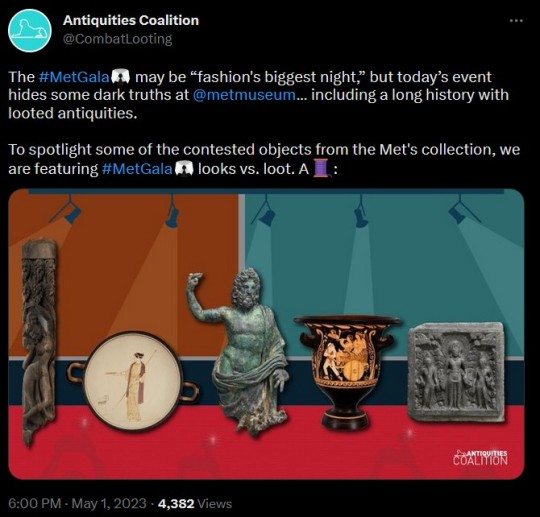
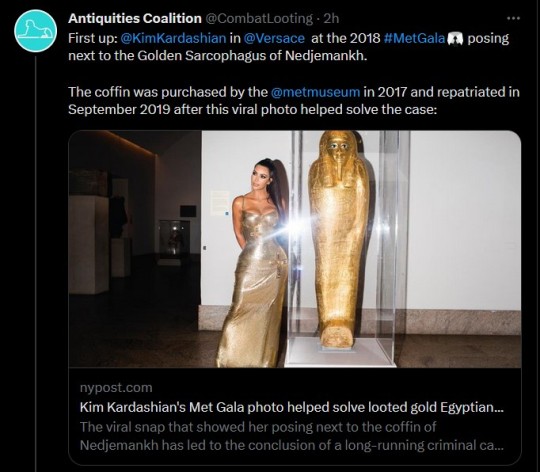
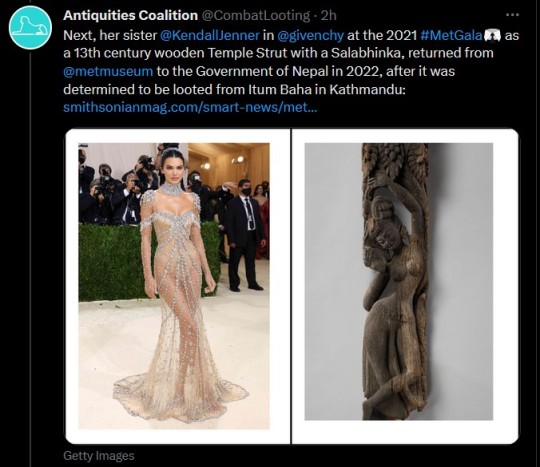
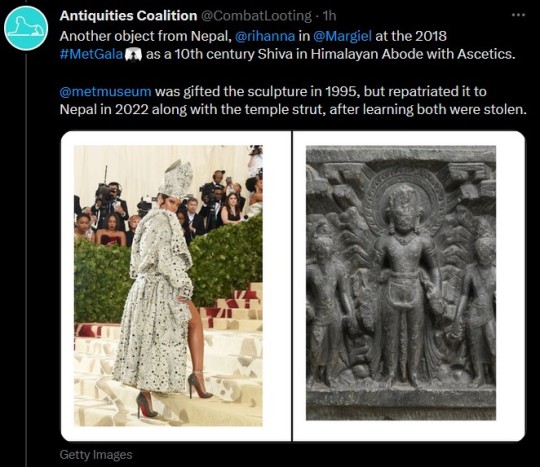

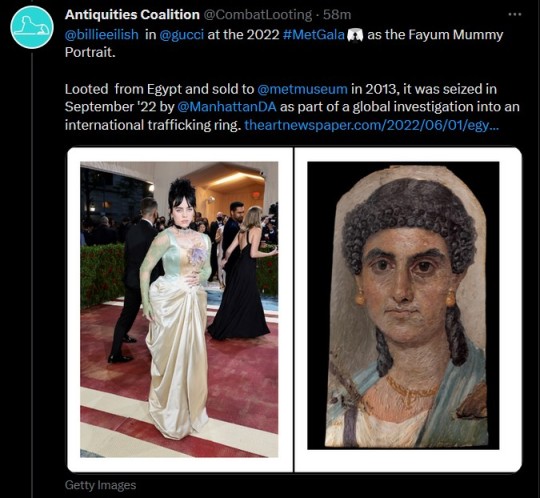
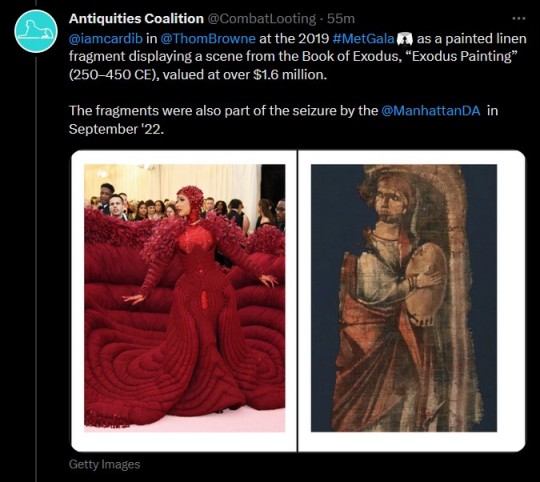
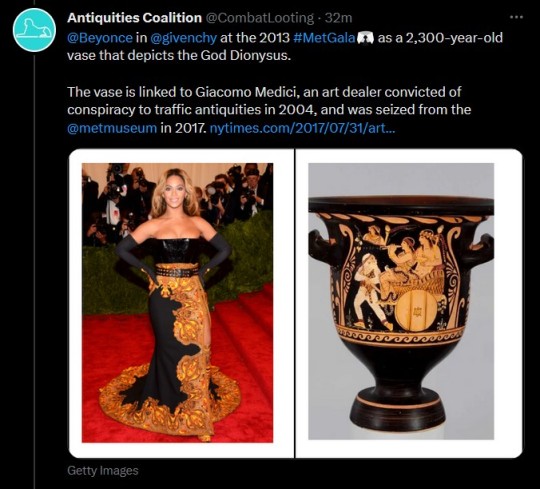
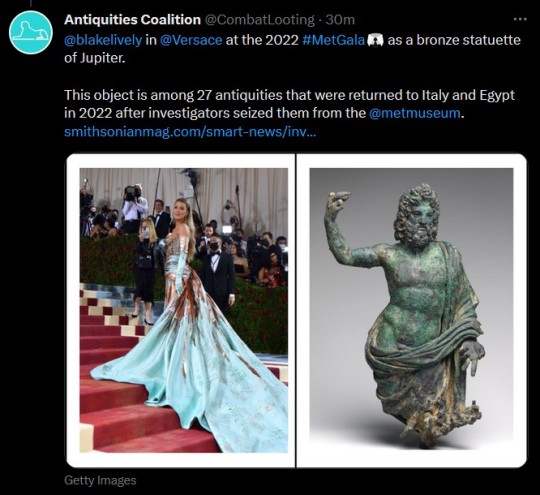
Looks vs. Loot at the Metropolitan Museum of Art by The Antiquities Coalition (@/CombatLooting) on Twitter
Transcription below the cut
1: The #MetGala may be "fashion's biggest night," but tonight's event hides some dark truths at @/metmuseum...including a long history of looted antiquities. To spotlight some of the contested objects from the Met's collection, we are featuring #MetGala vs. Loot [THREAD]
2. First up: @/KimKardashian in @/Versace at the 2018 #MetGala posing next to the Golden Sarcophagus of Nedjemankh. The coffin was purchased by @/metmuseum in 2017 and repatriated in 2019 after this viral photo helped solve the case. (link)
3. Next, her sister @/KendallJenner in @/givenchy at the 2021 #MetGala as the 13th century wooden Temple Strut with Salabhinka, returned from @/metmuseum to the Government of Nepal in 2022, after it was determined to be looked from Itum Baha in Kathmandu. (link)
4. Another object from Nepal, @/rihanna in @/Margiel at the 2018 #MetGala as a 10th century Shiva in Himalayan Adobe with Ascetics. @/metmuseum was gifted the sculpture in 1995, but repatriated it to Nepal in 2022 along with the temple strut, after learning both were stolen.
5. Dakota Johnson in @/gucci at the 2022 #MetGala as a terracotta kylix (c. 470 bCE). This piece, valued at $1.5 million, was seized from the @/metmuseum in July 2022 after being linked to Italian antiquities trafficker Gianfranco Becchina. (link)
6. @/billieeilish in @/gucci at the 2022 #MetGala as the Fayum Mummy Portrait. Looted from Egypt and sold to @/metmuseum in 2013, it was seized in September '22 by @/ManhattanDA as part of a global investigation into an international trafficking ring. (link)
7. @/iamcardib in @/ThomeBrowne at the 2019 #MetGala as a painted linen fragment displaying a scene from the Book of Exodus, 'Exodus Painting" (250-450 CE), valued at over $1.6 million. The fragments were also part of the seizure by the @/ManhattanDA in September '22.
8. @/Beyonce in @/givenchy at the 2013 #MetGala as a 2,300-year-old vase that depicts the god Dionysus. The vase is linked to Giacomo Medici, an art dealer convicted of conspiracy to traffic antiquities in 2004, and was seized from the @/metmuseum in 2017. (link)
9. @/blakelively in @/Versace at the 2022 #MetGala as a bronze statuette of Jupiter. This object is among 27 antiquities that were returned to Italy and Egypt in 2022 after investigators seized them from the @/metmuseum. (link)
5K notes
·
View notes
Text
the monomyth, (leon kennedy x reader)

the exodus, also aptly known as retirement, has been sending leon for a loop. you are there to pull him back down to earth. (smut/fluff/overuse of greek references)
a/n: 18+ readers only! anyone under eighteen will be personally chased by me at full running speed. i am very much a classics nerd, as will be glaringly obvious in about three seconds. i love you nerd leon, no one understands you like i do.
shoutout to @vaaaaaiolet who was forced to listen to me ramble about this fic for three entire days
a single structure repeats itself in an endless loop of tragedy and non-tragedy, operating through the cycles of aristotle’s poetics in order to create a universal narrative of the roman hero. prologue, parados, episode, stasimon, and exodus– recycled and reused to form the endless configurations of misfortunes that befall the heroes. what is pervasive, and often tragic, about these heroes is not their moral struggles against the physical evils, but instead an internal and divine battle against a common enemy– time.
ultimately, what defines the perfect tragedian hero is the prevailing feeling of inescapability. they cannot run from the ties of fate that rely on them as a catharsis for conflict, and instead must emotionally resolve themselves to their social positions as a weapon for the gods, regardless of the institution’s ideology. this priori of obligation forced by an infinite and perfect consciousness is what makes the tragic hero tragic; this life is not one that they choose for themselves, but one they are forced to live until that last grain of sand slips through the hourglass.
leon’s eyes had started to burn thirty minutes ago, long ignored in favour of another jstor binge at a truly ungodly hour of the night. he, at least, had the chivalry of keeping his phone brightness on the lowest setting, screen carefully tilted away from your resting eyes.
this whirlwind of information had started with the myth of perseus, followed by odysseus, and then a countless amount of papers analyzing the hubris of the tragedian heroes. supplementary material for tomorrow’s breakfast conversation, so that he can talk at length over eggs and coffee across from your bright eyes and eager expression.
that’s what always killed him, just how genuinely interested you were in whatever he said. god knows that was especially rare, particularly from the other women in his life. claire was always half-listening whenever he lost himself on a tangent, and don’t get him started on trying to get ada interested in anything he had to say.
but ada was long gone, and claire was always delighted on your talent of getting leon off her back.
how contentedly boring his life has gotten that the most exciting part of his day is your opinion on his recent fixation, just to listen to you fill in all the missing pieces he never realized were absent. you were like that in almost every aspect of his life, the golden glue that slowly puts poor humpty dumpty back together again.
wrong type of mythology. regardless, you were something he never realized he desperately needed until that warm feeling of being content started filling his chest. a passing comment on his resemblance to a greek god had established this whole spiral– a form delicately cut in marble and praised over the centuries for the countless deeds committed in a long war to protect his people.
perseus, maybe. or odysseus, but that was too easy. too cliche. leon was never one for divine glory, instead preferring the silent type of satisfaction that came from finally putting some good back in this world. or preventing more terrible things from happening, more like. a careful balancing act, another stupid cycle of finally feeling like a person again until he can get home and stop the dreams of people screaming in your ever-so-loving arms.
bellerophon is the final choice. a figure riding into battle against the monstrous chimeric beast with only a tamed ally and a lead-tipped weapon. a hero that was never satisfied, choosing bigger and bigger fights until he falls from the heavens and into the dirt below. a god angered at his success, a product of an institution that brought him into a war he never asked for as a weapon, and left him crippled to wander the world alone when he ascended too far.
maybe retirement really was getting to him. this so-called period of exodus, a final parting song and the materialization of the final crisis.
you stir in your sleep then, arm sliding across his chest until your head is tucked against his bicep. he moves to rest his arm underneath your head instead, which instead of achieving its original purpose of comforting you, only causes your eyes to blink blearily up at him.
“get off wikipedia,” you mumble, shifting the blankets until it sufficiently covers the both of you. another thing he never noticed, how cold his legs were, sprawled uncovered on the mattress. this kind of comfortable routine is where you and leon thrived, so used to each other’s presence that accommodation was natural. “you should be sleeping, we have a big day tomorrow.”
“i’m on jstor. totally different site.” he supplies unhelpfully, earning a stern glare in return. his lips peck your forehead a moment after in apology. his version of proskynesis, a gesture of reverence towards his god that showed him admiration instead of ire.
“i was thinking of taking the bike,” the change in subject is nonchalant, like it’s not three thirty in the morning and you’re definitely functioning enough for idle conversation.
“hell no,” you grumble, sinking further into the mattress. “i’m not getting on that thing with you.”
leon shifts until he’s on top of you, now wide awake and grinning slyly down. “not a fan of my chariot?”
“while i usually do love riding you, that thing is a death machine.” the glimmer of amusement in your eyes now match his own. finally, you’re actually awake. an unspoken question, a command, given from the divine to its mortal instrument. “and i’ve seen the way you drive it. i very much value my life.”
“that’s different. i can’t exactly go slow on those things when there’s rabid dogs chasing me.” he alleviates his statement with a slow string of kisses down your neck, soft and gentle like he can’t snap someone’s neck with his bare hands. “and i’ll be careful. promise.”
“like you promised not to get hurt in alcatraz?” your rebuttal doesn’t phase him, his mouth still preoccupied with tracing down your neck until his fingers start to pull the collar of your shirt down.
“extenuating circumstances,” he mutters, lowering himself down the blankets until his mouth is in line with your hips. divine fate, maybe, or some other twisted machination of a higher being that decrees his near-death every six months. it’s hard to stare up and curse at the gods when they brought you to him, his own piece of olympus pliant in his hands.
your hips lift off the mattress as he pulls at your shorts, another directive he is all too happy to follow. hunnigan would be furious at his obedience, like a dog all too happy to head the leash.
“besides,” he continues, lips brushing against the frail skin of your upper thighs. “i’m officially a retired man. long past my prime.”
why does tragedy exist? is it purely to show the power of the gods, that they so fiercely defend the threads of fate that control every aspect of their existence? is it simply a consequence of the endless cycle of war invited by a world whose very frame requires an institution to desire it? regardless of its source, a world born of this mindset cannot escape an endless cycle of war that legitimizes a world-destroying violence, with no true winner other than the institution that began it.
his clothes are pulled off quickly, following yours. scraps of fabric thrown haphazardly around the room, ignored in favour of hands tracing along the contours of your body. gentle, reverent. nails tracing down every scar, every piece of evidence that you are real, that you are alive, and there’s nothing within these four walls that can take this away from him too.
“not too far past to not be horny in the middle of the night.” you huff, curling your hand in his hair to pull him back down to you. his breath ghosts over your thighs, his tongue darting out instinctively to wet his lips.
“i’m a simple man,” he lowers his mouth to you, licking a premeditative stripe up your folds. “got a beautiful wife in my bed. just can’t help myself.”
the hand in his hair pulls him closer, and leon understands the simple action for what it is. a cue to stop talking and get to work, to use his mouth for something other than popping off one-liners at inopportune moments. a man’s place is on his knees, and all that.
where leon is rough in every aspect of his life, he is always careful with you. he eats you out like it’s somehow the last time he’s ever going to do it, and the first time he’s ever tasted anything so divine. equal parts eager and careful, even as his fingers prod at your entrance.
you jut your hips up again, and he slips two in easily. every part of you is familiar with every part of him. his tongue and hands start a rhythm, a soft push and pull that slowly eases you to the peak. a peaceful trek to that coiled tension starting in your legs, thighs squeezing around his head in the way you know he likes.
that one took a while for him to admit; that he liked the feeling of being crushed between you. it was a long-drawn experiment on how far on the pain threshold he could bear before it got too much for him, until it started to push past pleasure and more into the drowning in the too-high waters of a lab territory. years of experience has taught you where to stop, his secret little tells that no one else knew about burrowed deep into your memory for safekeeping.
that furrow between his brow deepens, and you know to ease off a little. he kisses your clit in a silent thanks, before his rhythm resumes. while leon may not feel the decreased stamina of age yet, you are too aware of your limits to handle two orgasms, so you have the mind to pull him off before that point of no return.
leon sprawls on the mattress next to you, hands gently easing you up until your knees are bracketing his hips. not usually his preferred position, considering his penchant for control.
“my back hurts,” he mumbles softly, bringing your hand up to his mouth to kiss along your knuckles. “want you to ride me.”
“if you make another chariot joke, i’m seriously going to hit you.”
“ye’ of little faith,” his hand drops yours to line himself up with you, and a gentle push of his hips drives the tip of him into you. “i never make the same joke twice.”
your only answer is a shuddering gasp until you gain your bearings enough to sink down onto him fully. he lays still for a few seconds, letting you get used to the intrusion. his breath stutters in his chest as your hands lay flat onto it, right palm splayed right over his heart.
an uneven thump, beating so fast in his chest that its a god-given miracle he hasn’t keeled over yet.
there’s a unique type of mythmaking when it comes to the tragic heroine. it is a story of fear; innocence; fall from innocence; catharsis; being desired by the right people; being desired by the wrong people; by dangerous people; by excitingly dangerous people. revision is a privilege given to so few who desire it, and to be tender-hearted in a world defined by tragedy is to die.
and yet, the fruit of consideration when it comes to tragedy is not the moral resignation that comes with that acceptance. instead, it is a revealing of the self’s utter dependency on others. the reason that tragedy works is that character is built through this adversity. just as the nature of goodness appears in the face of moral evil, tragedy shows what is fragile and ultimately human about us.
but you are not a god, and he is not a myth. there is no divine fate here, only a random calculation of ethereal and clunky moments that controls so much of his life that he just has to live it. that dependence is the one good thing that has come from all the fighting, and the aching, and the loneliness. a perverted sort of serendipity that leon thanks the heavens for every waking moment.
he is real, and you are real, and that’s enough for him.
both of you are moving in tandem, chasing the upcoming release with a soft desperation. his hands are firmly grasping at your hips, kneading the flesh there like its the only thing tethering him to this reality. that heat of pleasure starts to coil in your gut, and judging by the twisted expression on leon’s face, he’s not too far behind.
“please,” he gasps, shoving you down until your chest is pressed against his. “i need-”
“i know,” you answer softly, pressing a chaste kiss to his lips that delightfully juxtapose the depraved way his hips are slamming against yours.
it’s like falling down from the heavens, except this time there’s no splatter of a body onto the earth. only a light feeling crawling through his limbs, like that final moment of peace before succumbing to the darkness. if the gods had asked him now for a sacrifice, he would have gotten on his knees all over again to keep you. when tranquility was once the bane of his existence, now it is the center of it.
you tense above him, like a goddess struck in stone until you are returned to the flesh, crumpling on top of him. a soft cough escapes him, a wheezing sound that signifies that you are most definitely crushing his lungs. the forces that be roll the both of you to the side until you’re facing each other, his hand unconsciously reaching for yours under the mattress. happy, warm, and sated– leon’s husbandly duties have officially been achieved.
“i love you,” he whispers, and he doesn’t even realize the tear escaping his eye until you gently wipe it away. every part of him now is soft and malleable, even the parts so carefully hidden from everyone else.
“love you too, old man.”
a final kiss to your forehead before he tucks you into his chest, “we’ll take the car tomorrow.”
two more hours until he can eat eggs and drink slightly shitty coffee, and finally fill you in on his newfound epiphany. his arms wrap around your half-conscious figure, body curling around you like something to protect. you hug him tightly in return, bare skin soft on your cheek. your arms hold him like he is sacred too.
#top academic of the police academy would absolutely go on random academic tangents and no one can fight me on that#thank you vaaaaaiolet for listening to the nonstop writing process#leon kennedy x reader#leon kennedy#resident evil#resident evil x reader#leon kennedy fanfiction#leon kennedy imagine#resident evil fanfiction#leon kennedy/reader#resident evil imagines#ali writes#leon kennedy smut
180 notes
·
View notes
Text
Never Again is NOW
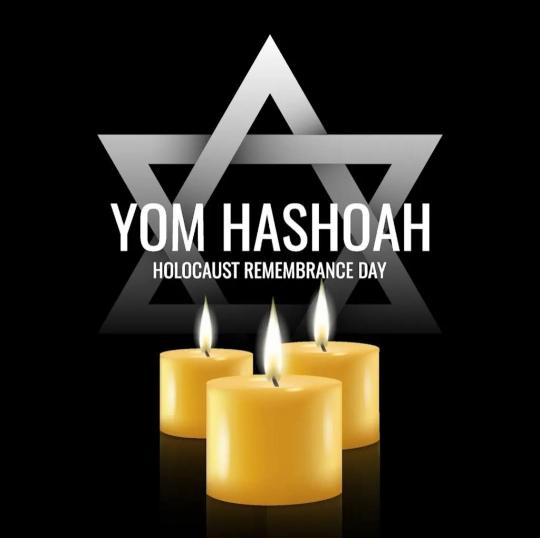
This evening marks the beginning of Yom HaShoah. This Jewish holiday and Holocaust Remembrance Day marks the anniversary of the Warsaw Ghetto Uprising.
Yom HaShoah is different than International Holocaust Remembrance Day. On International Holocaust Remembrance Day, we mourn the 6 million Jews, as well as the Romani and all the others who were systematically slaughtered by the Nazis during World War II.
Yom HaShoah is the day for Jews mourn our dead and to remember the Jews who heroically fought back against the Nazis in the Warsaw Ghetto Uprising. We mourn the 6 million Jews who were murdered the LAST time the entire world was infected by the mind-virus of Jew-hate.
In the midst of this current global tidal wave of Jew-hate, we Jews say NEVER AGAIN. Never again is NOW.
youtube
And a reminder to non-Jews who might try to steal this phrase:
Never Again is a Jewish phrase. Period. It doesn’t belong to non-Jews.
Never Again refers to the Shoah, and to the THOUSANDS of years of violent Jew-hatred we have endured before then.
Never Again states that we Jews will NEVER AGAIN be slaughtered by the millions.
If you are a goy, and you use this phrase for any other purpose, you are engaging in cultural appropriation.
You are appropriating Jewish trauma and pain that IS NOT YOURS.
Unless you are willing to shoulder the burden of 3500+ years of Jewish history, you do NOT get to use this phrase.
If you steal Never Again for any other context, all you are doing is broadcasting that you are a Jew-hating bigot who engages in Holocaust Inversion.
And you can take your antisemitic bigotry and go fuck off into the sun.
.
Baruch ata Adonai, Eloheinu melech ha-olam, borei p’ri hagafen.
Baruch ata Adonai, Eloheinu melech ha-olam, asher kid’shanu b’mitzvotav v’ratza vanu, v’shabbat kod’sho b’ahava uv’ratzon hinchilanu, zikaron l’ma’aseh b’reishit. Ki hu yom t’chila l’mikra-ay kodesh, zaycher l’tziat mitzrayim. Ki vanu vacharta v’otanu kidashta mikol ha’amim. V’shabbat kod-shi-cha b’ahava uv’ratzon hinchal tanu. Baruch ata Adonai, mi’kadesh ha Shabbat.
(Blessed are you, Lord our G-d, Ruler of the Universe, who creates the fruit of the vine.
Blessed are you, Lord our G-d, Ruler of the Universe, how has sanctified us with his commandments and favored us, and given us in love and favor his holy Shabbat as an inheritance, as a remembrance of the act of creation. For this day is the beginning of all holy days, a remembrance of the Exodus from Egypt. For you have chosen us and you have blessed us from among all the nations. And you have bequeathed us your holy Shabbat in love and favor. Blessed are you, Lord, who sanctifies Shabbat.)
.
Feel this, to all those races, colors, and creeds, every man bleeds
For the countless victims and all the families of the murdered, tortured, enslaved
Raped, robbed and persecuted — Never Again
To the men, women, and children who died in their struggle to live
Never to be forgotten, Reuven Ben Menachem, yo…
.
My own blood dragged through the mud
Perished in my heart, still cherished and loved
Stripped of our pride, everything we lived for
Families cried, there's nowhere to run to, nowhere to hide
Tossed to the side, access denied
6 million died, for what?
.
Yo, a man shot dead in his back
Helpless women and children under constant attack
For no reason 'til the next season and we still bleeding
Yo it's freezing and men burn in Hell, some for squeezing
No hope for a remedy, nothing to believe
Moving targets who walk with the star on their sleeve
Forever marked with a number tattooed to your body
Late night, eyes closed, clutched to my shotty
Having visions, flashes of death camps and prisons
No provisions, deceived by the Devil's decisions
Forced into a slave, death before dishonor
For those men who were brave, shot and sent to their grave
Can't awaken, it's too late, everything's been taken
I'm shaken, family, history in the making
.
Never again shall we march like sheep to the slaughter
Never again shall we sit and take orders
Stripped of our culture, robbed of our name
Raped of our freedom and thrown into the flames
Forced from our families, taken from our homes
Removed from our G-d then burned of our bones
Never again, never again, shall we march like sheep to the slaughter
Never again leave our sons and daughters
Stripped of our culture, robbed of our name
(Never again) Raped of our freedom and thrown into the flames
Forced from our families, taken from our homes
Removed from our G-d and everything we own (Never again)
.
Some fled through the rumors of wars
But most left for dead, few escaped to the shores
With just one loaf of bread, banished
Called in for questioning and vanished, never to be seen again
I can't express the pain, that was felt in the train
To Auschwitz, tears poured down like rain
Naked, face to face with the master race
Hatred, blood, and David, my heart belongs to God and stays sacred
Rabbis and priests, disabled individuals
The poor, the scholars — all labeled common criminals
Mass extermination, total annihilation
Shipped into the ghetto and prepared for liquidation
Tortured and starved, innocent experiments
Stripped down and carved up or gassed to death
The last hour, I smelled the flowers
Flashbacks of family then sent to the showers
Powerless, undressed, women with babies clumped tight to their chest — crying
Who would've guessed — dying
Another life lost, count the cost
Another body gas-burned and tossed in the Holocaust
.
Never again shall we march like sheep to the slaughter
Never again leave our sons and daughters
Stripped of our culture, robbed of our name
Raped of our freedom and thrown into the flames
Forced from our families, taken from our homes
Removed from our G-d and everything we own
Never again, never again, shall we march like sheep to the slaughter
Never again shall we sit and take orders
Stripped of our culture, robbed of our name
(Never again) Raped of our freedom and thrown into the flames
Forced from our families, taken from our homes
Removed from our G-d then burned of our bones (Never again)
.
Never Again. Never Again.
.
From the USA to Afghanistan
From Israel to Pakistan
From Iraq to Iran
To Russia, Poland, and France
From China over to Japan
Worldwide
Never Again
.
Shema Yisrael Adonai eloheinu Adonai ehad
(“Hear O Yisrael, the Lord is our G-d, the Lord is One.” The Shema is the most important prayer in Judaism. It is the declaration of our faith in one G-d. Jews say the Shema prayer every day, in the morning and evening. And we also say the Shema before we die.)
FIRE!
*GUNSHOT*
#jumblr#jewish history#yom hashoah#warsaw ghetto uprising#never again#never forget#never again is now#NOTE: I report and block antisemites. If any antisemites comment on this post you will be reported and blocked. You have been warned.#Youtube
169 notes
·
View notes
Text
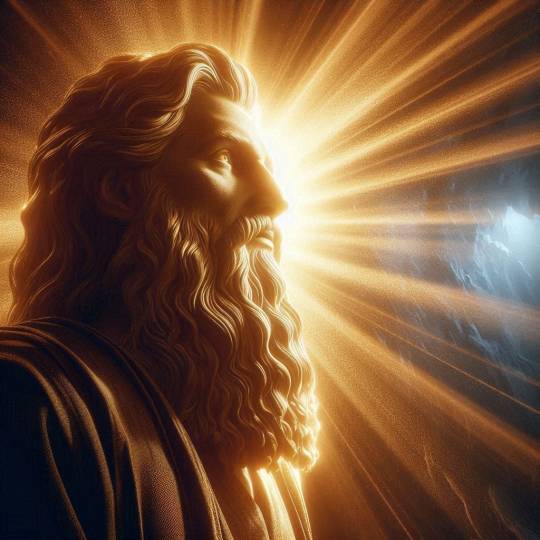
The New Stone Tablets
1 The Lord said to Moses, “Chisel out two stone tablets like the first ones, and I will write on them the words that were on the first tablets, which you broke. 2 Be ready in the morning, and then come up on Mount Sinai. Present yourself to me there on top of the mountain. 3 No one is to come with you or be seen anywhere on the mountain; not even the flocks and herds may graze in front of the mountain.”
4 So Moses chiseled out two stone tablets like the first ones and went up Mount Sinai early in the morning, as the Lord had commanded him; and he carried the two stone tablets in his hands. 5 Then the Lord came down in the cloud and stood there with him and proclaimed his name, the Lord. 6 And he passed in front of Moses, proclaiming, “The Lord, the Lord, the compassionate and gracious God, slow to anger, abounding in love and faithfulness, 7 maintaining love to thousands, and forgiving wickedness, rebellion and sin. Yet he does not leave the guilty unpunished; he punishes the children and their children for the sin of the parents to the third and fourth generation.”
8 Moses bowed to the ground at once and worshiped. 9 “Lord,” he said, “if I have found favor in your eyes, then let the Lord go with us. Although this is a stiff-necked people, forgive our wickedness and our sin, and take us as your inheritance.”
10 Then the Lord said: “I am making a covenant with you. Before all your people I will do wonders never before done in any nation in all the world. The people you live among will see how awesome is the work that I, the Lord, will do for you. 11 Obey what I command you today. I will drive out before you the Amorites, Canaanites, Hittites, Perizzites, Hivites and Jebusites. 12 Be careful not to make a treaty with those who live in the land where you are going, or they will be a snare among you. 13 Break down their altars, smash their sacred stones and cut down their Asherah poles. 14 Do not worship any other god, for the Lord, whose name is Jealous, is a jealous God.
15 “Be careful not to make a treaty with those who live in the land; for when they prostitute themselves to their gods and sacrifice to them, they will invite you and you will eat their sacrifices. 16 And when you choose some of their daughters as wives for your sons and those daughters prostitute themselves to their gods, they will lead your sons to do the same.
17 “Do not make any idols.
18 “Celebrate the Festival of Unleavened Bread. For seven days eat bread made without yeast, as I commanded you. Do this at the appointed time in the month of Aviv, for in that month you came out of Egypt.
19 “The first offspring of every womb belongs to me, including all the firstborn males of your livestock, whether from herd or flock. 20 Redeem the firstborn donkey with a lamb, but if you do not redeem it, break its neck. Redeem all your firstborn sons.
“No one is to appear before me empty-handed.
21 “Six days you shall labor, but on the seventh day you shall rest; even during the plowing season and harvest you must rest.
22 “Celebrate the Festival of Weeks with the firstfruits of the wheat harvest, and the Festival of Ingathering at the turn of the year. 23 Three times a year all your men are to appear before the Sovereign Lord, the God of Israel. 24 I will drive out nations before you and enlarge your territory, and no one will covet your land when you go up three times each year to appear before the Lord your God.
25 “Do not offer the blood of a sacrifice to me along with anything containing yeast, and do not let any of the sacrifice from the Passover Festival remain until morning.
26 “Bring the best of the firstfruits of your soil to the house of the Lord your God.
“Do not cook a young goat in its mother’s milk.”
27 Then the Lord said to Moses, “Write down these words, for in accordance with these words I have made a covenant with you and with Israel.” 28 Moses was there with the Lord forty days and forty nights without eating bread or drinking water. And he wrote on the tablets the words of the covenant—the Ten Commandments.
The Radiant Face of Moses
29 When Moses came down from Mount Sinai with the two tablets of the covenant law in his hands, he was not aware that his face was radiant because he had spoken with the Lord. 30 When Aaron and all the Israelites saw Moses, his face was radiant, and they were afraid to come near him. 31 But Moses called to them; so Aaron and all the leaders of the community came back to him, and he spoke to them. 32 Afterward all the Israelites came near him, and he gave them all the commands the Lord had given him on Mount Sinai.
33 When Moses finished speaking to them, he put a veil over his face. 34 But whenever he entered the Lord’s presence to speak with him, he removed the veil until he came out. And when he came out and told the Israelites what he had been commanded, 35 they saw that his face was radiant. Then Moses would put the veil back over his face until he went in to speak with the Lord. — Exodus 34 | New International Version (NIV) Holy Bible, New International Version®, NIV® Copyright ©1973, 1978, 1984, 2011 by Biblica, Inc.® All rights reserved worldwide. Cross References: Genesis 16:13; Genesis 22:5; Genesis 32:30; Exodus 3:1-2; Exodus 4:27; Exodus 6:23; Exodus 16:10; Exodus 17:10; Exodus 17:14-15; Exodus 18:12; Exodus 19:8-9; Exodus 19:22; Exodus 19:24; Exodus 21:1; Exodus 25:1; Exodus 28:1; Leviticus 9:6; Leviticus 10:1; Joshua 24:24; 1 Kings 19:8 Matthew 26:28; Mark 14:24; John 1:18; John 6:46; 1 Corinthians 11:25; 2 Corinthians 3:3; 2 Corinthians 3:7; Hebrews 8:9; Hebrews 9:19; Hebrews 12:29
Commentary on Exodus 34 by Matthew Henry
Key Passages in Exodus 34
1. The tablets are replaced 5. The name of the Lord proclaimed 8. Moses entreats God to go with them 10. God makes a covenant with them, repeating certain duties 28. Moses after forty days on the mount, comes down with the tablets 29. His face is radiant, and he covers it with a veil
#new stone tablets#festivals#Moses#Moses' radiant face#covenant#duties#God#Israel#Exodus 34#Book of Exodus#Old Testament#NIV#New International Version Bible#Biblica Inc
10 notes
·
View notes